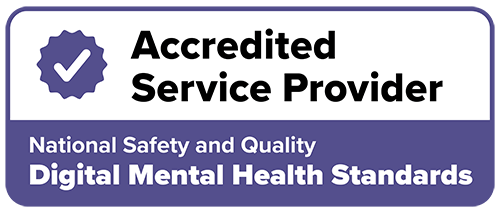The KickStart programs work
75%

The KickStart programs work
Getting a handle on substance use and criminal activities is a massive challenge for community-based offenders. KickStart programs deliver the strategies to meet those challenges.
KickStart’s fundamental aim is to create meaningful behavioural change in community-based offenders. During the KickStart Pilot, participants reported significant improvements in their emotional regulation (as measured by the DERS); and reduced criminal thinking (as measured by the PICTS).
Other key indicators of behaviour change in KickStart participants are the frequency of urine test breaches and Correction Order breaches.
What does it mean if a service is accredited to the National Safety and Quality Digital Mental Health Standards?
A government agency called the Australian Commission on Safety and Quality in Health Care wrote the Digital Mental Health Standards to help people identify high quality digital mental health services. They worked with people who use digital mental health, mental health experts and industry to make sure that accredited services pay attention to the things that keep services safe.
An accredited service keeps your information private and they will ask for your feedback to make the service better. They also make sure their services are based on strong evidence.
A service gets accredited by an approved agency that has been trained to check for safety and quality issues. They check evidence to show the service meets the Digital Mental Health Standards so you can know that the service keeps people safe.
The Commission has more information on the Digital Mental Health Standards and what accreditation means.
The individual effect
From program kickoff to completion, participants noticed marked improvements across physical and psychological health, social relationships and environment.
IMPROVED EMOTIONAL REGULATION*
*as measured by the DERS
REDUCED CURRENT CRIMINAL THINKING*
*as measured by the PICTS
MOTIVATION LEVELS INCREASED*
*as the program progressed

The Group Model fosters a sense of belonging and community and allows participants to learn from the experiences of others.

Completion of KickStart is likely to predict successful completion of a community correction Order.
The outside perspective
Community Corrections Officers reported that KickStart participants demonstrated a greater awareness and understanding of their feelings and how these related to their offending behaviour. It was also noted that participants were more open to discussing emotional regulation, mental health and goal setting.
The KickStart program overview
The foundations for change.
The program includes two flexible formats – a 42-hour or 24-hour group program and a 15-hour or 8-hour individual program.
Group Program
42 hours (15 sessions) OR 24 hours (8 sessions)
Male offenders serving community Corrections Orders, combined custodial sentences or parole
Individual Program
15 hours OR 8 hours
Male offenders serving community Corrections Orders who are unsuitable for group programs
Digital KickStart
The KickStart programs can now be accessed via a web-based platform incorporating digital enhancements to create a more accessible and engaging experience for participants.
The majority of participants say they would prefer to access the KickStart program online and complete the activities digitally.
Facilitators report that the digital programs reduce administration time, are fun to deliver and allow for real-time tracking of participant’s progress.


